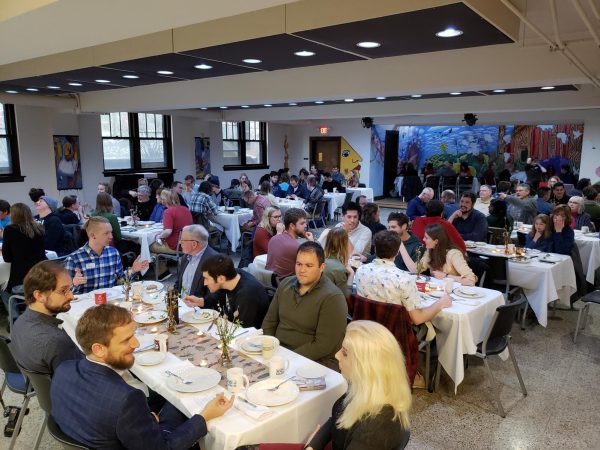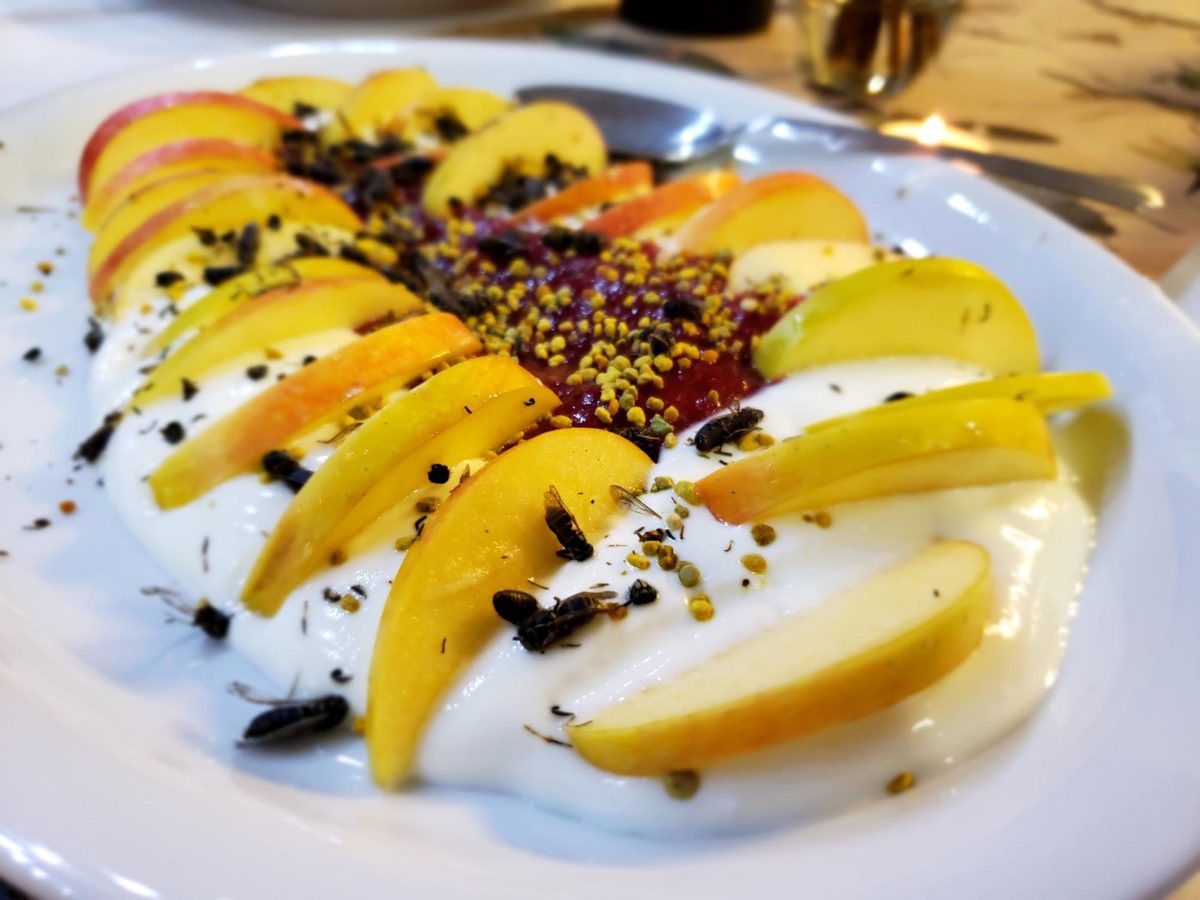The University of Wisconsin Undergraduate Entomology Society hosted its fourth annual Swarm to Table event Saturday, April 13 at The Crossing. Selling out 300 tickets for the third year in a row, S2T celebrates insects in food, art and human culture.
UES saw great success at their first event in 2019 and after a two-year hiatus due to COVID-19, the event was brought back in 2022. Highlights of this year’s event include an insect food-tasting menu, an art gallery showcase including art from UW students and local community members, and an information expo with people from across the Midwest involved in entomophagy and agriculture.
Entomophagy is the practice of humans consuming insects as food, according to the Cambridge Dictionary. It encompasses a wide range of culinary traditions and is gaining recognition for its nutritional and environmental benefits.
UES’s goal for the event is to break the stigma around insects as a food source through exposure in a way that is fun, hands-on and attractive to both bug lovers and those who may not know much about insects. UES President Ava Schassler sees the event as the perfect opportunity to do that.
“We want people to come and see the atmosphere and be like, oh, this is actually pretty cool … If they can leave not feeling scared of bugs or have the stigma around the idea, I think we did our job,” Schassler said.
Addressing stigma about insect eating was one of the major reasons S2T started in 2019. Co-founder and current partner of the event Valarie Stull aimed to highlight positive aspects of insects through art and comradery.
Stull currently helps with two major research projects at UW involving entomophagy. The first is creating a black soldier fly colony on campus — a species increasingly used in agricultural practices by taking food waste or livestock manure and turning it into protein. They hope the colony can help manage on-campus food waste and produce protein for poultry feed.
Stull’s second project, in partnership with Colorado State University, assesses the health impacts of consuming dietary fiber from insects. Currently, they are running a clinical trial with adults diagnosed with irritable bowel syndrome to see if consuming 4g of insect fiber contributes to lower levels of inflammation and gut health. The study is scheduled to conclude this summer.
Stull is also a co-founder of MIGHTi, a nonprofit organization operating in Zambia, the U.S. and Rwanda. MIGHTi seeks to improve health and well-being through innovations in agriculture, education and health.
One MIGHTi project introduced insect farming in Zambia. They worked to combat food hunger in troubled regions by increasing nutrition and food security while promoting livelihoods and avoiding stress on finite environmental resources. MIGHTi has been a key partner for S2T since its inception, bringing an international focus to the event.
According to a recent publication by Stull and former UES president Michael Smith, many foreign countries practice insect-eating, which is deeply rooted in cultural traditions and culinary heritage. From street vendors in Thailand serving up crispy fried crickets, to markets in Mexico offering spicy chapulines (grasshoppers), insects are celebrated as flavorful delicacies.
In African nations like Nigeria and Ghana, termites and pawnee worms are commonly enjoyed as protein-rich snacks, while in parts of Southeast Asia, ant eggs and water bugs. Insects are often incorporated into dishes in creative ways, whether as a crunchy topping on salads or as a key ingredient in savory stews, according to Stull’s publication.
These culinary traditions not only showcase the rich diversity of global cuisines but also highlight the sustainable and nutritious potential of insect-based foods. Breaking the Western bias against insects as a food source was a goal Stull feels has been a successful product of S2T.

“The idea of S2T was to bring together academics, students, industry leaders and community members to collectively learn about, celebrate and engage with insects as food and feed,” Stull said.
According to Smith, the applications of insects in food systems and as sustainable food sources are unlimited. As a food source, insects have adequate proteins, fats, vitamins and minerals, and can be cultivated to reproduce in large quantities. Such a replicable and easily cultivated practice can provide food with high nutrition in areas struggling with famine.
Insects also have a low carbon footprint. The practice creates fewer greenhouse gasses and uses much less water than other high-protein practices. As global warming and climate change challenges continue to increase, the environmental benefits of insect-eating practices make it an alternative to be heavily considered moving forward, Smith said.
While the possibilities for insects to be a human food source are intriguing, insects as feedstock are becoming increasingly common. Being virtually distributed worldwide, insects can survive in a multitude of different climates, Smith said.
According to current S2T partner Kevin Bacchuber, insects are positioned low on food chains, which means they often serve as prey populations, offering large populations, and high biomass, to feed numerous organisms. From farms and livestock to fish farms to pet food, to even fertilizer, an easily digestible and replicable protein and mineral-rich food source has countless practical uses worldwide.
Smith and Bacchuber see insects in feedstock as a massive potential market with the right research.
Smith cites pathogen concerns and current post-consumer food waste legislation as roadblocks, but the further demonstration of sustainability practices through research and successful healthy products can change that.
Smith stresses the importance of producing results that show farmers the efficacy of insects as feedstock compared to traditional methods. Research can show farmers that yields are not decreasing when using insect feedstock, and high-quality products can still be produced.
According to Bachhuber, insect waste, known as frass, has the potential to produce natural fertilization. Insects in this sense would play the role of a natural recycling agent and their properties would be reintegrated back into the environment similarly to manure, while being less wasteful and harmful to the environment than traditional fertilizers. A natural cycle of insects as feedstock becoming waste produced by both animals and insects and eventually yield fertilizer could become the future of agricultural practice with many sustainability benefits.
Swarm to Table provides participants with a new understanding of food cultures and the importance of insects in maintaining the ecosystem. According to Bacchuber, entomology research is looking towards advancements in understanding the nutritional content of insects, improving sustainable farming practices and using those in application to food security.


